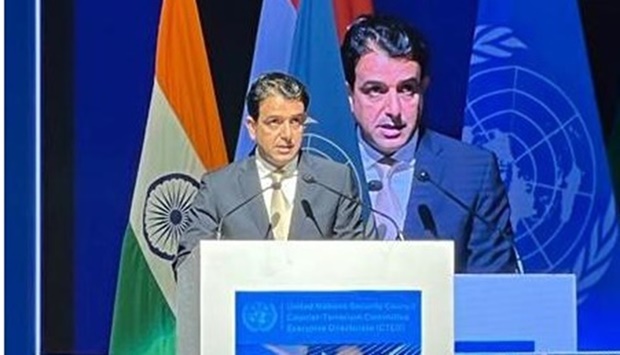Qatar participated in the special meeting of the Security Council's Counter-Terrorism Committee on combating the use of new and emerging technologies for terrorist purposes, which was held in the Indian capital, New Delhi.
The delegation of the State of Qatar participating in the meeting was headed by HE the Special Envoy of the Minister of Foreign Affairs for Counterterrorism and Mediation in Conflict Resolution Dr. Mutlaq bin Majed Al Qahtani.
In Qatar's statement to the meeting, HE Al Qahtani stressed that modern technology can be harnessed to address the phenomenon of terrorism by promoting peace, dialogue and tolerance between countries and peoples, mediation and good offices to achieve stability and world peace.
He said that the State of Qatar continues to update its national legislation, regulations and strategies related to combating terrorism, not only in implementation of its international obligations, but also to implement the latest international standards, to keep pace with developments and to harness modern technology, such as databases, analytical capabilities and techniques in the areas of border control and law enforcement, and securing public and vital sites to combat terrorism.
HE Al Qahtani added that Qatar is looking forward to more cooperation and coordination with the various relevant authorities in confronting this threat in accordance with the provisions of international law, including international human rights law.
He pointed out that the rapid innovations and developments in various modern technologies provide great opportunities to enhance the effectiveness of counter-terrorism measures, combat the financing of terrorism and combat violent extremism.
In this regard, he pointed out that the cyber threat, the development of terrorist networks, the misuse of new and emerging technology by some countries and terrorist groups to launch electronic attacks against vital infrastructure, incitement, recruitment, planning, financing and dissemination of propaganda in support of terrorism, constitute a serious threat to international peace and security, stressing the need to use modern and innovative ways to confront it.
He added that perhaps the best approach to confronting these terrorist threats lies through a comprehensive review of national legislation and international charters, and the development of new policies, especially in cyber security and combating cyber terrorism, as well as strengthening national, regional and international cooperation and partnerships with actors from the public and private sectors, and exchanging experiences and relevant information.
In this context, HE Al Qahtani focused on the importance and role of the United Nations, led by the United Nations Office of Counter-Terrorism, the Counter-Terrorism Executive Directorate, and the Counter-Terrorism Committee of the Security Council in strengthening cooperation, coordination and partnership among them, and coherence, integration and intensification of their joint efforts in providing and implementing the necessary technical assistance for countries to combat the use of new and emerging technologies for terrorist purposes.
He stressed Qatar's keenness to support the work of the Security Council's Counter-Terrorism Committee and constructive cooperation with it and the Executive Directorate, which was recently represented in a successful visit to the Executive Directorate of the State of Qatar, which highlighted the available technical capabilities that the State of Qatar can provide in this regard.
In this context, he referred to the cooperation and partnership with the United Nations Office of Counter-Terrorism, and said that the financial contributions provided by the State of Qatar allowed the United Nations Office of Counter-Terrorism to implement many initiatives and programs to prevent the use of modern and emerging technologies for terrorist purposes, among which is the United Nations Counter-Terrorism Program Terrorist Travel, which helps beneficiary countries detect terrorists using advance passenger information and passenger name record systems, as well as holding a high-level conference on combating terrorism through innovative approaches and using modern and emerging technologies, as well as the Global Program on Autonomous and Remotely Operated Systems, which it seeks to enhance the capabilities of states to counter threats related to anti-terrorist unmanned aerial systems.
He expressed Qatar's aspiration for more cooperation, coordination and integration between United Nations agencies, in particular the Counter-Terrorism Executive Directorate and the United Nations Office of Counter-Terrorism, in enhancing the capabilities of Member States and private organizations to prevent cyber-attacks carried out by terrorist organizations against vital infrastructure, and the spread of terrorist content and terrorist communications via the Internet, and the financing of digital terrorism, with the importance of measuring the impact and results of this cooperation.

The delegation of the State of Qatar participating in the meeting was headed by HE the Special Envoy of the Minister of Foreign Affairs for Counterterrorism and Mediation in Conflict Resolution Dr. Mutlaq bin Majed Al Qahtani.
